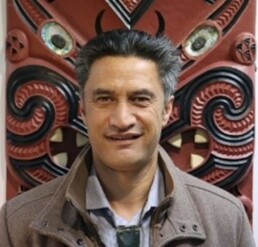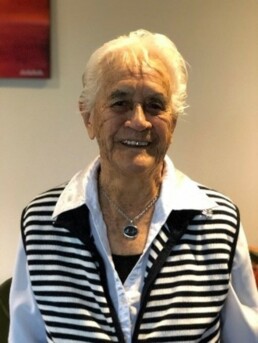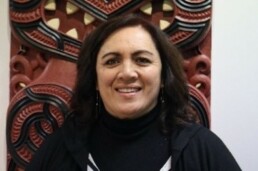Māori Education TrustBoard of Trustees

Chairperson: Bayden Barber (BMS, CMInstD)
Ngāti KahungunuNgāpuhiNgāi Tahu
Bayden is from and lives in Waimārama, Hawke’s Bay. His iwi affiliations are Ngāti Kahungunu, Ngāpuhi and Ngāi Tahu. Bayden is an experienced governor and is on a number of boards. He has just finished 6 years as a Hastings District Councillor. He is an independent director on Beef and Lamb NZ, and a commissioner on Te Taura Whiri i Te Reo Māori. Bayden was also recently elected as chair of Ngāti Kahungunu Iwi Incorporated.
Bayden is an alum of the Māori Education Trust, having received a Manaaki Tauira grant during his time at Waikato University where he graduated with a Bachelor of Management Studies. He is also a graduate of Te Panekiretanga o Te Reo. Bayden is a chartered member of the Institute of Directors. Bayden represents the New Zealand Māori Council on the Māori Education Trust Board and was first appointed in 2015. He is the chair of the Scholarship Committee and has an interest in ensuring Māori tamariki reach their full potential in education. Bayden is excited with the growing number of partnerships with government, iwi, tertiary and other education providers, and Māori organisations as a means of growing our scholarship offerings to our people. Whāia te iti kahurangi, ki te tuohu koe me he maunga teitei!

Dame Iritana Tawhiwhirangi
Ngāti PorouNgāti KahungunuNgāpuhi
Dame Iritana is no stranger to those involved in Māori education and we are fortunate to have had her long-term involvement as a Board member. Dame Iritana represents the National Kohanga Reo Trust on the Board and is recognised nationally and internationally as the strength behind the success of the movement.
Toitū Kaupapa Māori Mātauranga certainly continues to benefit from the stoic characteristics and guidance of our Kōkā. Ngā mihi nui ki a koe e te Kōkā. He kura tangata e kore e rokohanga. You are our indefinable treasure.

Brenda Soutar
Ngāti PorouNgāti AwaNgāi Tai ki Tāmaki
Before taking up her current role with Te Rūnanga Nui o ngā Kura Kaupapa Māori o Aotearoa, Brenda was principal of Mana Tamariki in Palmerston North. With over 30 years’ experience in education across kōhanga reo, kura kaupapa Māori and whare wānanga, Brenda has maintained an active involvement in Māori language revitalisation and regeneration. She brings firsthand experience of what Māori learners need in order to access and enjoy educational opportunities that are relevant to them and their whānau. As a tertiary student in the mid-eighties, like many others, Brenda was the recipient of grants from the Māori Education Foundation before it became the Māori Education Trust. She was appointed to the Board in 2022 to represent Te Rūnanga Nui o ngā Kura Kaupapa Māori o Aotearoa.

Mere Skerrett
Ngāi TahuTe ArawaWaikato/Maniapoto
Dr Mere Skerrett is the Area Representative for the Te Waipounamu Māori Womens Welfare League rohe and is representing the League and its interests in education and health with the Māori Education Trust. She is currently the Co-Head of School and Associate Professor in Te Puna Akopai, the School of Education, Te Herenga Waka Victoria University of Wellington. She spent much of her career advocating for, and teaching in, both the primary and early childhood sectors and initial teacher education with a focus on critical literacy, critical race theory, colonialism, indigenising the academy and Indigenous languages revitalization. A Mātanga Reo, Mere is a graduate from Te Panekiretanga o te Reo Māori as the Kirikawa in tikanga. She proudly wears the moko kauae to represent her journey into ‘te whakarauora reo Māori’ and ‘te katinga o te kēti’ the very last intake to graduate from that Academy.
Recent research projects include Kia ketekete mai anō ngā kākākura: Language teaching and learning in initial teacher education (to understand the contribution made by the different facets of initial teacher education programmes to the overall aim of developing and maintaining an ongoing commitment to learning and assisting with revitalising te reo Māori. She was an advisor to Kia hoe tahi i te awa o ako: Working collaboratively for successful transitions in Māori Medium exploring the transition of tamariki and their whānau from kōhanga reo to kura kaupapa Māori with two kōhanga reo and two kura kaupapa Māori settings in Christchurch and advisor to the Ministry of Education’s Te Hurihanganui which aims for system change to eliminate racism in education. Earlier this year, in concert with a group of colleagues, they came together to write a wellbeing guide to accompany a climate education programme for schools in Aotearoa. The approach was to begin with learning from young people about what they thought was important for such a guide. Her collaborative government funded research in the National Science Challenge – He Pā Mataora: Learning to live with the living pā: is about seizing the rare opportunity afforded in the lead-up to the opening of Te Herenga Waka Victoria University of Wellington’s Living Pā (surrounding builds to the marae) to explore the needs and challenges of moving an entire marae community into more climate adaptive and resilient practices.
Mere was this year the recipient of Te Tohu Pae Tawhiti Award from the New Zealand Council for Research in Education recognising researchers who have made significant contributions to Māori education by conducting high-quality rsearch over an extended period.